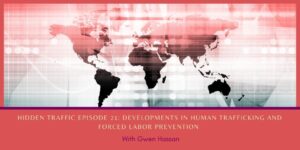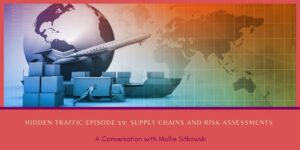The Trump Administration has suspended FCPA enforcement for the foreseeable future. What does that mean for compliance professionals? Hui Chen has suggested this should be seen as an opportunity for compliance, but to do so, “It’s time to up your game . . . Instead of selling insurance for FCPA enforcement, become leaders that help your organizations perform.” Based on this challenge by perhaps the most imminent compliance commentator around, I am going to devote the next several blog posts to ways in which compliance professionals can indeed up their collective game and demonstrate the importance of not simply compliance but ethics and compliance. Today, it is in your Supply Chain.
Have you ever stopped to consider the human rights abuses at the root of the products you use daily? From solar panels to computer screens, the exploitation of the Uyghur minority in China is a painful reality that has been hidden from Western consumers for far too long. Compliance professionals must now confront this issue head-on, ensuring their organizations meet regulatory requirements and uphold ethical business practices.
The global supply chain, long enabled by forced labor and geopolitical complexities, faces a reckoning. The Uyghur Forced Labor Prevention Act (UFLPA), the shifting dynamics of global trade post-COVID-19, and increasing tensions with China all underscore the urgent need for corporations to re-evaluate their sourcing strategies. Let’s explore the key measures compliance professionals must take to mitigate these risks and establish a more ethical and resilient supply chain.
UFLPA represents a turning point in corporate responsibility. This legislation prohibits goods made wholly or partly in Xinjiang from entering the U.S. unless companies can provide clear and convincing evidence that their products are free from forced labor. Given the widespread exploitation in this region, achieving compliance is no small feat.
Xinjiang, home to the oppressed Uyghur population, is a major hub for materials like neon, steel, lithium, and silica, which are critical components in many industries. These industries, controlled by paramilitary organizations, thrive on forced labor, driving down production costs while manipulating global markets.
For compliance professionals, this presents a major challenge. Companies must:
- Conduct thorough supply chain audits.
- Require suppliers to provide clear documentation proving ethical sourcing.
- Leverage technology, such as blockchain, to improve transparency.
- Engage with third-party investigators to conduct independent assessments.
Taking UFLPA compliance seriously is not just a legal obligation but a moral one. Companies that fail to act risk hefty fines and irreparable reputational damage.
Diversifying the Supply Chain: A Risk Management Necessity
Over-reliance on China has long been a vulnerability, and recent geopolitical tensions have only magnified this risk. A diversified supply chain is an ethical imperative and a strategic advantage. Companies can mitigate supply chain disruptions and regulatory exposure by expanding sourcing beyond China.
Compliance professionals should advocate for:
- Investment in Southeast Asia. Vietnam, Malaysia, and Cambodia offer alternative sourcing opportunities with fewer ethical concerns and growing industrial capabilities.
- Nearshoring to North America. Mexico presents an interesting alternative because of its proximity to the U.S. and its established manufacturing sector.
- Enhanced supplier due diligence. Companies must ensure that alternative suppliers comply with international labor and human rights standards.
The ability to pivot away from forced labor-dependent supply chains will help companies meet compliance requirements and enhance long-term business continuity.
Investing in Alternative Sources of Supply
Beyond geographic diversification, businesses must rethink their sourcing strategies to ensure sustainability and security. Investing in alternative materials and innovative technologies can reduce dependence on high-risk supply chains.
Key actions include:
- Developing alternative raw material sources. Lithium, silica, and other key materials can be sourced outside of Xinjiang, reducing exposure to forced labor risks.
- Strengthening partnerships with ethical suppliers. Vetting and fostering long-term relationships with suppliers in ethical jurisdictions ensures compliance and reliability.
- Investing in R&D for alternative technologies, such as researching new production methods and materials, can help reduce dependence on unethical sources.
Compliance officers must take the lead in integrating these strategies into corporate supply chain policies, ensuring that ethical considerations are embedded in procurement decisions.
Reshoring Manufacturing: Enhancing Security and Compliance
Reshoring, bringing manufacturing back to stable, free-market economies, presents an interesting solution to supply chain vulnerabilities. Companies that invest in domestic or nearshore production benefit from:
- Greater regulatory oversight and labor protections.
- Reduced risks of tariffs, sanctions, and trade restrictions.
- Shorter, more resilient supply chains.
The U.S. and UK, in particular, offer untapped manufacturing potential with over 525,000 underutilized manufacturers in the U.S. alone. Reshoring can help companies mitigate the risks associated with China while bolstering domestic economies.
For compliance professionals, reshoring initiatives should be integrated into long-term corporate strategy discussions. While the initial costs may be higher, the long-term benefits—ethical assurance, reduced risk exposure, and supply chain resilience—far outweigh the challenges.
The Case for Investing in U.S. Manufacturing
Beyond reshoring, direct investment in U.S. manufacturing presents an opportunity to ensure both ethical and economic stability. Compliance professionals should advocate for:
- Incentives for domestic production. Lobbying for tax incentives and subsidies can help make U.S. manufacturing cost-competitive.
- Strengthening workforce training programs. Investing in a skilled domestic workforce ensures long-term manufacturing sustainability.
- Leveraging technology to enhance efficiency. Automation and advanced manufacturing techniques can offset higher labor costs, making U.S. production more viable.
With 525,000 manufacturers in the U.S. currently underutilized, the potential for strengthening domestic supply chains is immense. Businesses willing to make this investment will gain ethical credibility and a long-term competitive advantage.
The Compliance Mandate for Ethical Supply Chains
The Uyghur Forced Labor Prevention Act, geopolitical tensions with China, and the need for supply chain diversification are not just news headlines but corporate compliance imperatives. Companies that fail to address these challenges risk legal consequences, operational disruptions, and reputational harm.
To navigate this evolving landscape, compliance professionals must:
- Ensure rigorous UFLPA compliance through enhanced audits and documentation requirements.
- Advocate for supply chain diversification to mitigate reliance on high-risk regions.
- Invest in alternative sourcing and ethical suppliers to ensure business continuity.
- Consider reshoring manufacturing to enhance oversight and security.
- Champion investment in U.S. manufacturing as a long-term compliance and business strategy.
By taking these steps, companies can move beyond reactive compliance and become proactive leaders in ethical business practices. The future of corporate supply chains must be built on transparency, sustainability, and respect for human rights. Compliance professionals are uniquely positioned to drive this change, ensuring regulatory adherence and a more just and equitable global marketplace.






